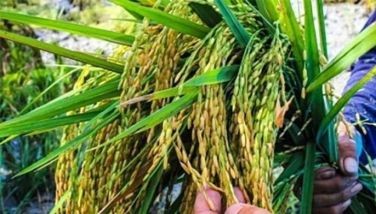Phl drug problem: A major American headache
The proliferation of illegal drugs in the Philippines continues unabated, with an alarming increase in the number of drug addicts noted even among schoolchildren. Drug money is a major source of funding for terrorist organizations, which is why the problem of narco-terrorism has become a growing concern for the United States. In 2004, the US and the Philippines engaged in exercises in preparation for a widespread anti-narco-terrorism campaign precisely because the Philippines has been identified as a major transit point for marijuana and shabu. Dubbed as “Baker Piston 04-2,†the anti-narcotics training conducted by US soldiers included intelligence gathering and other aspects meant to increase interoperability between military and other concerned agencies.
As early as 2003, the UN World Drug Report already noted the increasing number of Filipinos, many of them women, being arrested in many foreign countries for becoming drug mules – obviously lured by the easy money offered by big-time international drug rings. In fact, the Philippines was tagged as a “drug smuggler’s paradise†in a 2006 International Narcotics Control Strategy Report (INCSR), citing the country’s extensive coastline and porous borders and noting that the drug trade has become a multibillion dollar industry involving organized crime in China, Hong Kong and Taiwan, with terrorist groups engaged in drug-money laundering activities.
But while airports continue to be the preferred route of drug trafficking organizations, the 2013 United Nations Office on Drug and Crime (UNODC) World Drug Report disclosed that maritime routes are becoming a growing headache for anti-drug authorities, with “maritime seizure consistently more likely to be larger than a seizure involving transport by road or rail.â€
“Increases in seizures and use of opiates and methamphetamine throughout Southeast Asia – and the diversification of smuggling routes – indicate the drug economy is growing and money flows are increasing to the transnational organized crime groups that states struggle to deal with,†a UNODC official revealed.
And although maritime seizures constitute just 11 percent of all cases across drug categories globally, each of these seizures yielded 30 times more volume than those intercepted by air, the UNODC report said. Which goes to show that anti-drug smuggling agencies should focus on drugs being trafficked over waters because the quantities are much larger.
That’s probably why the US has been closely monitoring the developments regarding the Philippines’ maritime dispute with China – watching our borders not so much because of the threat of Chinese aggression but the menace posed by drug trafficking. After all, the US State Department did not mince words when it fingered Chinese organized crime groups as the big financiers of shabu manufacturing and smuggling in the country, with China and India identified as the primary source of precursor chemicals used in drug manufacturing. The State Department also included the Philippines – one of the countries of “primary concern†– in its list of top drug-money laundering countries in the world, disclosing that rebel groups operating in the country get funding from crimes that include kidnapping as well as drugs and arms smuggling.
Our man in Washington tells us that the nomination of Bureau of Intelligence and Research (INR) chief Philip Goldberg as the next Ambassador to the Philippines indicates the growing concern of the US over the problem of narco-terrorism. Ambassador Goldberg is highly regarded by the US intelligence community, whose experience in Chile and Bolivia makes him an expert on counterterrorism and narco-trafficking.
Ambassador Goldberg was expelled by Bolivian president Evo Morales in 2008 on accusations that the American Ambassador was aiding political opponents of Morales. However, Spy Bits sources say that US efforts to curb the drug trade did not sit well with the leftist Morales – a former leader of a coca growers union – because Bolivia had a thriving coca business. Next to Colombia and Peru, Bolivia is the third largest grower of cocaine. In 2008, the Bolivian government expelled the US Drug Enforcement Agency and eventually Goldberg.
In its latest INCSR report, the US blasted Bolivia for its failure again in meeting obligations under international counter-narcotics agreements. Significantly too, Chile – where Ambassador Goldberg was posted prior to Bolivia – is emerging as an increasingly important transit country for Bolivian traffickers who sell cocaine to local and other destinations that include Europe and the US.
In the Philippines, one issue that continues to undermine the fight against the drug problem is the perception of corruption among members and officials of the Philippine Drug Enforcement Agency – something that the 2013 INCSR said is a “concern.†The negative perception was further fueled by accusations from PDEA agent Jonathan Morales that the agency head, Gen. Arturo Cacdac – is allegedly “afraid†of going against big-time Chinese drug lords.
While Cacdac has denied the allegations, with the Palace expressing confidence that PDEA is doing a good job, many people are wondering why the PDEA chief suddenly “turned tail†and left a televised interview in an ABS-CBN morning show after learning that Agent Morales was also going to be present. So now people are asking, was he also afraid of Morales?
Spy tidbit
A Manila Golf member who is privy to backroom dealings told us that Ayala Land is interested in buying out all shares of Manila Golf Club members. The Manila Golf premises is a prime property connecting to Bonifacio Global City, and obviously, it would give Ayala Land a huge boost to its development plans if it acquires the golf club property. We were told the initial offer is P20 million per share with an option for members to have a stake in a new Manila Golf club to be relocated in another Ayala Land development near Nuvali. The current offer for a Manila Golf share is now P53 million with no sellers. The Ayala Land offer will most likely get the cold shoulder from the “snooty†members of the exclusive golf club.
***
Email: [email protected]
- Latest
- Trending
























